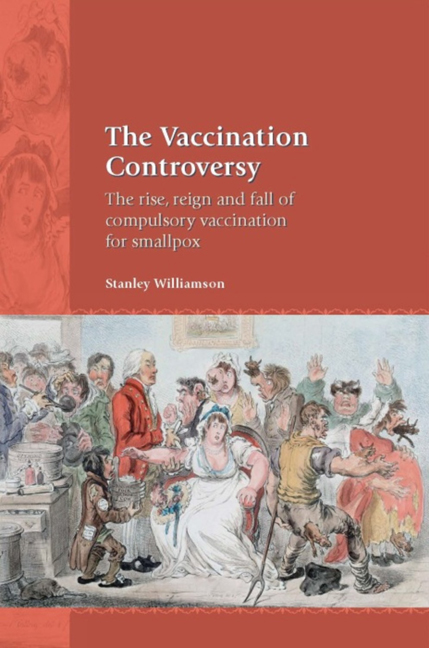Book contents
- Frontmatter
- Dedication
- Epigraph
- Contents
- Acknowledgements
- Part I The Road to Compulsion
- 1 The Byzantine Operation
- 2 The Small Pockes
- 3 The Engrafted Distemper
- 4 The Language of Figures
- 5 The Suttonian System
- 6 The Great Benefactor
- 7 The Speckled Monster
- 8 The Three Bashaws
- 9 A Competent and Energetic Officer
- 10 Formidable Men
- 11 The Present Non-System
- 12 Toties Quoties
- 13 Crotchety People
- Part II The Reign of Compulsion
- Part III The Retreat from Compulsion
- Notes
- Bibliography
- Index
10 - Formidable Men
from Part I - The Road to Compulsion
- Frontmatter
- Dedication
- Epigraph
- Contents
- Acknowledgements
- Part I The Road to Compulsion
- 1 The Byzantine Operation
- 2 The Small Pockes
- 3 The Engrafted Distemper
- 4 The Language of Figures
- 5 The Suttonian System
- 6 The Great Benefactor
- 7 The Speckled Monster
- 8 The Three Bashaws
- 9 A Competent and Energetic Officer
- 10 Formidable Men
- 11 The Present Non-System
- 12 Toties Quoties
- 13 Crotchety People
- Part II The Reign of Compulsion
- Part III The Retreat from Compulsion
- Notes
- Bibliography
- Index
Summary
In his life of Leslie Stephen, The Godless Victorian, Noel Annan describes ‘the new experts’, the reformers and administrators who dominated and defined the emerging society of early and mid-Victorian Britain:
They were men of inexhaustible energy, of disinterested probity, of indefatigable industry; but tact, compromise and suavity were foreign to their natures. They had the strength of mind to establish principles for dealing with the problems they were set, but once formed they could admit no other and closed their minds because the administrative structures they had invented seemed to them the only feasible way of dealing with the problem…
The most obvious example of this breed of ‘formidable men’, as Annan calls them, was Edwin Chadwick, one of the principal architects of the New Poor Law of 1834. This had replaced a ‘ramshackle and extravagant contrivance’, but Chadwick remained impervious to the outcry that his reform was harsh and ‘inhumane’. John Simon had worked with Chadwick as his ‘noble disciple and friend’, in the words of one commentator, and in his own study of English Sanitary Institutions, written when he was himself no longer playing an active part in public life, he went out of his way to defend Chadwick from some of the more severe charges levelled against him:
In the earlier stages of Mr. Chadwick's career, when the essence of his work was to force public attention to the broad facts and consequences of a great public neglect, it mattered comparatively little whether, among his eminent qualities he possessed the quality of judicial patience; but in his subsequent position of authority demands for the exercise of that virtue were great and constant…
Among the faults for which Chadwick was then criticized were ‘a liability to one-sidedness on questions of science and administration, a failure to listen duly to dissentient voices […] and a too despotic tone in affairs of local and personal interest’; but these might be generalized as ‘faults of over-eagerness [that] fall into moral unimportance as compared with his sincere and disinterested zeal for the public service’. Confronted with evidence of unnecessary human suffering, ‘the indignation which he was entitled to feel […] is a not ignoble excuse for such signs of over-eagerness as he may have shown’.
- Type
- Chapter
- Information
- The Vaccination ControversyThe Rise, Reign and Fall of Compulsory Vaccination for Smallpox, pp. 135 - 141Publisher: Liverpool University PressPrint publication year: 2007



